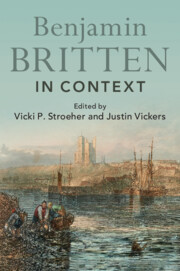Book contents
- Benjamin Britten in Context
- Composers in Context
- Benjamin Britten in Context
- Copyright page
- Dedication
- Contents
- Figures
- Tables
- Notes on Contributors
- Acknowledgements
- Bibliographic and In-Text Abbreviations
- Prologue
- Part I The Britten Circle(s)
- Part II British Musical Life
- Part III Britten and Other Composers
- Chapter 17 The Compositional Context
- Chapter 18 Responding to a British Musical Past
- Chapter 19 Britten and the English Musical Renaissance
- Chapter 20 Responding to the Continent
- Chapter 21 An English Tradition?
- Chapter 22 ‘An Exciting Time with All the Russians’
- Chapter 23 The Avant-Garde
- Part IV Wordsmiths, Designers, and Performers
- Part V British Sociocultural, Religious, and Political Life
- Further Reading
- Index
Chapter 18 - Responding to a British Musical Past
from Part III - Britten and Other Composers
Published online by Cambridge University Press: 31 March 2022
- Benjamin Britten in Context
- Composers in Context
- Benjamin Britten in Context
- Copyright page
- Dedication
- Contents
- Figures
- Tables
- Notes on Contributors
- Acknowledgements
- Bibliographic and In-Text Abbreviations
- Prologue
- Part I The Britten Circle(s)
- Part II British Musical Life
- Part III Britten and Other Composers
- Chapter 17 The Compositional Context
- Chapter 18 Responding to a British Musical Past
- Chapter 19 Britten and the English Musical Renaissance
- Chapter 20 Responding to the Continent
- Chapter 21 An English Tradition?
- Chapter 22 ‘An Exciting Time with All the Russians’
- Chapter 23 The Avant-Garde
- Part IV Wordsmiths, Designers, and Performers
- Part V British Sociocultural, Religious, and Political Life
- Further Reading
- Index
Summary
The inevitable pairing of the names of Britten and Purcell, a pairing promoted by Britten himself, was one in which he was linked to Britain’s ‘only’ composer. In response, Britten willingly took on the mantle of hope for English composition. At the same time, there is no doubt that the Britten felt an affinity with the earlier composer, and drew considerable strength and inspiration from his works. However, although Britten’s response is often presented as a personal one, this article suggests that his engagement with Purcell’s music was part of an earlier and broader picture of the use and reuse of earlier English music in the first decades of the twentieth century. His engagement with Purcell’s music, which included realisations of his songs and the use of forms and techniques associated with the composer, was at its most intense in 1945, and was focused on the period round 21 and 22 November, the dates of the Wigmore Hall concerts which saw the premieres of Britten’s Quartet No. 2 and The Holy Sonnets of John Donne. The reception of Britten’s ‘Purcell’ works was sometimes mixed, but this article concludes that for Britten, it was a matter of supreme enjoyment.
Keywords
- Type
- Chapter
- Information
- Benjamin Britten in Context , pp. 155 - 162Publisher: Cambridge University PressPrint publication year: 2022

